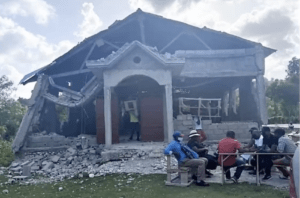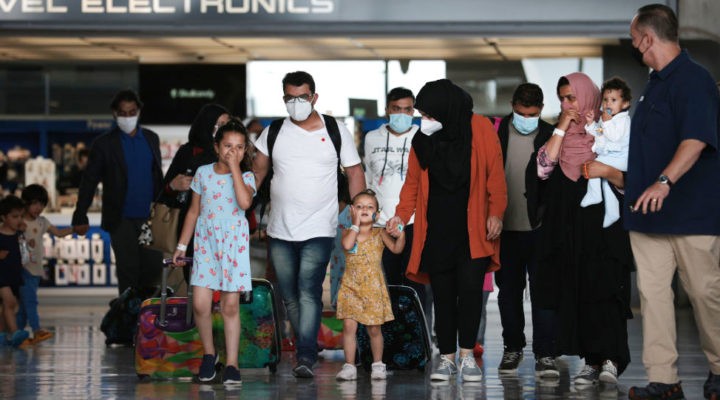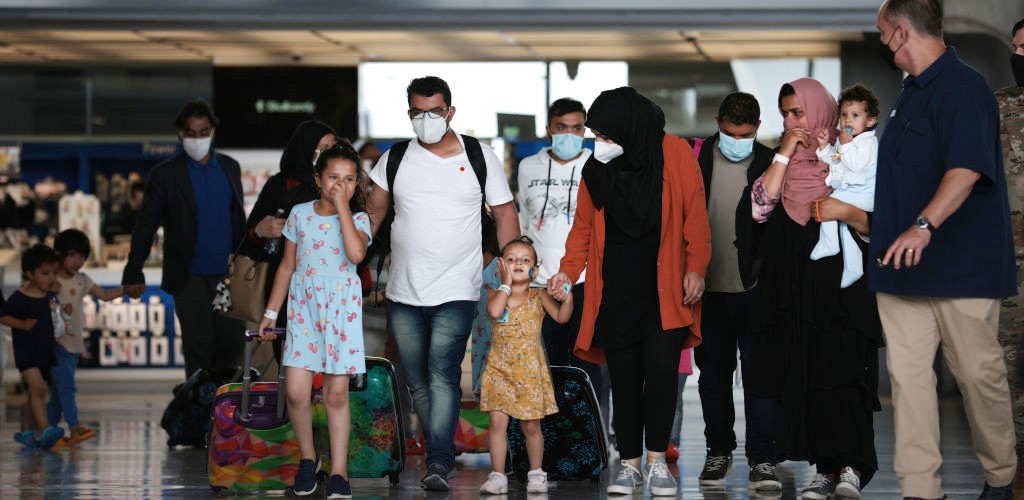Bewilderment and apathy are predicable responses to the news of one global disaster after another, but they are no excuse for inaction on the part of Christians and church communities, a series of speakers said during a call to action for Haiti and Afghanistan.
“It’s really natural to be overwhelmed and to say, as Jesus’ disciples did when they saw a large crowd in need, ‘Send them away,’” said Matthew Soerens, the U.S. director of church mobilization for World Relief, a global Christian humanitarian organization that co-sponsored the Sept. 2 virtual session with Women of Welcome and We Welcome Refugees. The Facebook Live event was titled “Prayer and Action Townhall for Haiti and Afghanistan.”

Matthew Soerens
Rather than shrink from the task, Jesus responded with compassion and directed his followers to feed the masses with whatever they had, which happened to be a few fish and pieces of bread, Soerens said. “And I think God is calling us to offer what we have, even if that seems inadequate to the scale of this problem, and to trust that God can use it.”
That message was echoed by other speakers, including Christian author Ann Voskamp and World Relief President and CEO Myal Greene, who urged more than 1,350 viewers to help victims of the ongoing refugee crisis in Afghanistan and of the 7.2-magnitude earthquake that struck Haiti last month.
Americans barraged with news of such events, plus the ever-present problems of hunger and poverty, instinctively may want to shut down, said moderator James Misner, senior vice president of strategic engagement with World Relief.

James Misner
“You might feel a little stuck. The challenges we see today are not going to be gone tomorrow,” he said. “These are generational issues. And generational issues need generational solutions.”
The virtual townhall was structured to provide a three-part approach for individuals and churches to move “from feeling stuck to feeling engaged,” Misner said.
The first task is to become aware of the needs of Haitian earthquake victims, of Afghan refugees coming to the U.S. and of those left behind in the Taliban-ruled nation.
Greene said these crises are even more numbing on the heels of a global pandemic that has created a rapid acceleration of global hunger and poverty: “These are historic times.”

Myal Greene
In the past few weeks, World Relief has settled in the U.S. 400 Afghan refugees who hold special immigrant visas, the type given to Afghans and Iraqis who served coalition forces as interpreters and in other capacities.
And many more refugees are on the way, as resettlement groups have been told to expect at least 50,000 in coming weeks and months.
Greene said people of faith are needed to help with their transitions to life in the U.S.
“We believe the church of God is to be the instrument he uses to bring restoration to a broken world,” he said. “Tens of thousands of Afghans have fled the evil of the Taliban. Will we rise up to respond?”

Jenny Yang
But there are many more still in Afghanistan who need assistance, added Jenny Yang, World Relief’s senior vice president for policy and advocacy.
Many Afghans who worked for U.S. and allied militaries and some U.S. citizens are still in the country, said Yang, co-author with Soerens of Welcoming the Stranger: Justice, Compassion & Truth in the Immigration Debate.
And there must be concern for ethnic and religious minorities and persecuted women, she added. “We are still urging the Biden administration to continue the evacuation of our allies and to press neighboring countries to accept Afghan refugees.”
She also urged viewers to share their concerns with members of Congress.
“We know that the U.S. mission ended on Aug. 31, but we believe our job as a church has actually just started,” Yang said. Those who were evacuated must “feel and understand the love of the church and understand Christian hospitality as they arrive here. And the church should be at the front lines of showing hospitality, of praying and advocating for our Afghan brothers and sisters in Christ.”

In Haiti, a church relief committee meets outside the rubble of their building to make plans to help their community. (Photo: World Relief)
The needs are just as desperate in Haiti, where at least 22 people died, 344 remain missing and more than 132,000 homes were damaged or destroyed in the August earthquake that struck the nation’s southern peninsula, said Lydia Dawson, humanitarian and disaster response coordinator for World Relief.
At least 650,000 Haitians need humanitarian assistance, which includes food packages, hygiene kits and shelter supplies.
Yet it’s inspiring to see that hundreds of Haitian volunteers assisting in relief efforts have helped despite their own problems, Dawson said. “It’s been beautiful to see because many of these church communities and volunteers have themselves been impacted. The church buildings may be damaged, but the church is very much alive and well.”
Soerens and Voskamp advised viewers to consider the scriptural imperatives of ministering to refugees, the poor and the hungry.
In addition to the story of Jesus feeding the multitudes in Matthew, Soerens pointed to passages in Zechariah and Isaiah as commands to welcome the stranger and the destitute.
And the New Testament book of James reminds believers that prayer is important but must be accompanied by effort, Soerens said. “Our response has to be more than wishing people well, but taking action.”

Ann Voskamp
Voskamp, a bestselling author and founder of We Welcome Refugees, said the Bible makes clear that God’s people are to treat strangers as members of their own families.
“God is saying oppressed people are our people. God is saying pay attention to the poor because it’s paying attention to the Lord,” she said. The hospitality extended to refugees is “showing hospitality to God himself. The person on the other side of things is always an image of Christ.”
Giving financially is a solid first step to showing hospitality, said Jeff Walser, senior director of development at World Relief. Advocating for the oppressed by vocalizing support for faith-based, compassionate public policy is another. “And stay involved. We must fight for lasting change.”
In a written statement, Bri Stensrud, director of Women of Welcome, said Christians cannot sit by while so many suffer.
“Evangelical women are, like so many Americans, heartbroken by the devastation in Afghanistan and in Haiti, and our faith compels us to be a part of the solution,” she said. “Women are mobilizing their church communities to respond to both crises and striving to practice Christlike welcome for Afghans who have begun arriving and are likely to arrive in larger numbers in the weeks to come.”
Related articles:
She’s pro-life and pro-immigrant and trying to bring other evangelical women along
‘Humanitarian catastrophe’ unfolding in Afghanistan
Baptists worldwide uniting to offer aid to Haiti as challenges mount


